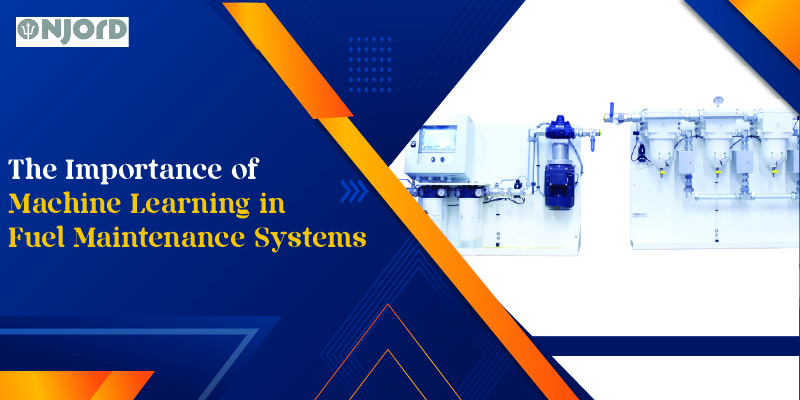With Njord Filtration's intelligent data analytics and real-time monitoring, businesses can now predict issues before they arise, reduce downtime and extend the life of their fuel infrastructure. In this blog, we will go deeper into how this works, the benefits and how it helps you run your machinery smoothly. Keep reading to know more.
But first...
What Are Fuel Maintenance Systems?
Now, as you may know, fuel maintenance systems are designed to keep the fuel clean, stable and optimal over time. This happens in diesel, biodiesel and other hydrocarbon-based fuels. These systems involve filtration units to remove particulates and water, conditioning modules to stabilize fuel, monitoring sensors to track contamination and quality, and finally, the pump and circulation systems for proper fuel flow.
All these components work together to protect the vital parts of your machines. It focuses on the engines, generators and machinery from the adverse effects of microbial growth, sludge, sediment and oxidation. But the risk? Without proper predictive maintenance, the systems can fail without warning. This is where machine learning in fuel maintenance systems comes in.
The Importance of Predictive Maintenance
Let’s consider this: there are two types of maintenance strategies: reactive and scheduled maintenance. While reactive maintenance fixes problems only when they arise in the machine, preventive maintenance addresses issues before they occur. On the other hand, scheduled maintenance involves performing routine checks regardless of the system's condition.
Now, while Reactive maintenance can lead to costly downtime and asset damage, scheduled maintenance may waste resources on unnecessary service or miss hidden issues. So what now? Well, this is where predictive maintenance comes in.
- Machine learning powered predictive maintenance offers a more innovative solution.
- Using machine learning for predictive maintenance in fuel systems, your machine learning algorithms analyse real-time and historical data, detecting early warnings, component failures, and recommending timely actions.
- With this, you will experience fewer unplanned downtimes, lower costs, and your fuel systems will continuously operate at peak efficiency.
(Also read from our previous blogs: How are Fuel Polishing Systems Important for Oil and Gas High-Risk Operations?)
What are the benefits of Machine Learning in Fuel Maintenance?
The following are the benefits of AI and machine learning in fuel maintenance systems:
- More Uptime: Machine Learning allows you to detect issues before they become a surprise or emergency.
- Less Maintenance: Maintenance becomes easier when needed, with less labour and materials.
- Better Fuel Efficiency. AI machine learning helps you to clean systems. This is equivalent to better combustion and fuel economy.
- Longer Equipment Life with timely maintenance reduces wear and tear on engines, pumps and filters.
- Real-time data and automated reporting for environmental and fuel quality standards
- 24/7 Monitoring and Alerts, even when you miss monitoring fuel systems 24/7. The AI can help you receive alerts when issues arise, even in remote or unattended locations.
So, How Does it work?
Once Machine Learning starts using the algorithm to learn patterns, here is how it will work:
- Data Processing & Pattern Recognition
ML models process data in real-time. This helps them detect abnormal patterns that may indicate system failures or performance degradation. For example, if the ML detects an increase in water content after rain in the engine, it will advise you to address the tank issue before the water damages your machine’s fuel. - Data Collection
Sensors in filtration units, storage tanks and pipelines collect data on temperature, Pressure, Flow rates, Water content, Fuel quality metrics, Filter clogging levels and microbial contamination in the fuel. - Predictive Analytics
Ultimately, with these predictive analytics for fuel system maintenance, the ML system will inform you when to replace the filter, the likelihood of microbial blooms, clogging events, and system efficiency dips.
The best part is that the system will generate maintenance schedules based on the actual wear and tear of each component.
Key Technologies in AI-Powered Maintenance
The following are the key technologies in AI-powered maintenance machines:
- Smart Sensors to collect high-resolution data in real time.
- Cloud Computing to see how Fuel system data is stored, processed and analyzed on the cloud. It makes insights available to you or professional mechanics from anywhere.
- Mobile Dashboards that allow Managers and technicians to receive alerts and performance reports on their phones or tablets. So, no matter where you are, this feature enables you to make informed, reliable remote decisions.
- Cybersecurity Protocols with sensitive data moving through networks ensure robust security for safe and private machine learning operations.
Bottom Line
While it may sound confusing, fuel maintenance systems are appropriately taken care of when your engines adapt to AI integration. Not only does it predict faults and inform you before the condition worsens, but it also allows you to access real-time data and track how your engine has been performing over the past few months.
So, when it comes to taking care of your engine's fuel system, Njord Filtration is the most reliable source of experts.
Need to consult immediately? Contact us here for more information or reach out to us here: +31-13-7640706
